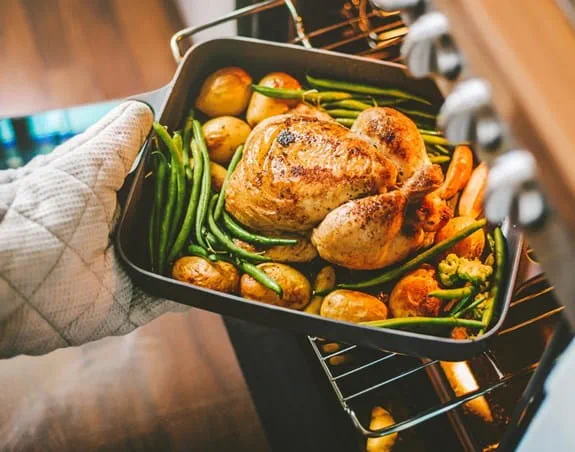Limit red and processed meat
Why you should choose alternatives to red and processed meat more often
Eating red and processed meat increases cancer risk.

Our recommendation
The Canadian Cancer Society recommends eating a variety of protein foods and choosing alternatives to red and processed meat more often.
What is red meat?
Red meat is any type of meat from mammals, such as beef, veal, pork, lamb, mutton or goat.
What is processed meat?
Processed meat is any meat preserved by smoking, curing or salting or by adding preservatives. Most processed meats are made from beef or pork, but they can also be made from turkey and chicken. Ham, bacon, salami, hot dogs and sausages are examples of processed meats. Sliced deli or luncheon meats made with chicken or turkey are also processed meats.
How do red and processed meats increase cancer risk?
When any meat is preserved by smoking, curing, salting or adding preservatives, cancer-causing substances can be formed.
Research shows a connection between processed red meat and cancer. For other processed meats like chicken, turkey or fish, check the label for preservatives like nitrates or nitrites. If these preservatives are not listed, these meats are usually a better choice than processed red meats.
If I cut back on red meat, how will I get enough protein?
Good question! Your body needs protein to grow cells, heal tissue and maintain a healthy immune system to fight disease. Red meat is high in protein but you can still get the protein you need from many other protein foods.
Other excellent protein foods include:
- fish and seafood
- poultry like chicken and turkey
- dairy products such as yogurt, cheese and milk
- legumes such as beans, peas, lentils and soybeans
- nuts and seeds
- eggs
6 ways to reduce red and processed meat
Check out these 6 ways you can reduce red and processed meat in a healthy diet.
Choose the leanest cuts of meat and trim any visible fat before cooking. A serving of red meat is 85 grams (3 ounces) when cooked – smaller than a deck of cards.
When making a chili or stew, cut the meat quantity in half and replace it with double the amount of beans or other legumes. Make meat go further by chopping it into small pieces, buying ground meat and using smaller amounts in stir-fries, salads and pasta sauces.
Save hot dogs for baseball games and occasional barbeques and smoked hams for holiday dinners instead of making them part of your regular diet.
Choose dishes like vegetarian tacos, chili or hearty salads with legumes for a fun and filling meal without the meat.
Try a veggie wrap with hummus on whole grain bread for lunch instead of a sandwich with cold cuts. Make a pizza without pepperoni. Add boneless chicken chunks with lots of veggies and herbs instead.
Make up the rest of your meal with vegetables and whole grains.
Research shows that cooking meat, poultry and fish at high temperatures (frying, broiling or barbecuing) may increase your risk of cancer. Why? Cancer-causing substances are formed when these foods are cooked at high heat.

5 cooking habits that will reduce your cancer risk
Your trusted source for accurate cancer information
With support from readers like you, we can continue to provide the highest quality cancer information for over 100 types of cancer.
We’re here to ensure easy access to accurate cancer information for you and the millions of people who visit this website every year. But we can’t do it alone.
Every donation helps fund reliable cancer information, compassionate support services and the most promising research. Please give today because every contribution counts. Thank you.
